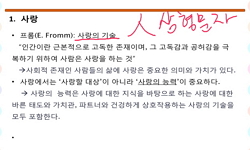This is a cross-sectional correlation study to examine correlation among ethics position, self-esteem, and perception of patient medical information protection in dental hygiene students and also figure out factors influencing their perception of pati...
http://chineseinput.net/에서 pinyin(병음)방식으로 중국어를 변환할 수 있습니다.
변환된 중국어를 복사하여 사용하시면 됩니다.
- 中文 을 입력하시려면 zhongwen을 입력하시고 space를누르시면됩니다.
- 北京 을 입력하시려면 beijing을 입력하시고 space를 누르시면 됩니다.
부가정보
다국어 초록 (Multilingual Abstract)
This paper used the structuralized questionnaire developed by modifying and complementing the EPQ(Ethics Position Questionnaire) developed by Forsyth (1980), the self-esteem measuring tool developed by Rosenburg (1986), and also the measuring tool for perception of patient medical information protection developed and used by Lee Mi-young (2004). 500 students were selected with the stratified sampling method from universities having the department of dental hygiene in Korea, and the research was performed from September 1st till November 1st, 2013 with the self-reporting method. For data analysis, SPSS 12.0 was employed, and for the consideration on the subjects, deliberation was done by IRB (IRB No : P01-201311-SB-03).
1. About ethics position in dental hygiene students, idealism position received 3.84 points, and relativism position got 3.54 points. And about the category of ethics position, higher points were gotten in situationists, absolutists, subjectivists, and exceptionists in order. Regarding idealism position in dental hygiene students, there was significant difference in satisfaction with the major (p=0.001), satisfaction with clinical training (p=0.031), and recognition on ethics codes (p=0.001). About relativistic disposition, there was significant difference in the school system (p=0.027) and the school record (p=0.011). And regarding self-esteem and perception of patient medical information protection in dental hygiene students, situationists received the highest points.
2. Self-esteem got 3.55 points out of 5, the perfect score. And there was significant difference in the grade (p=0.007), personality (p<0.001), family climate (p<0.001), monthly average income (p=0.004), school record (p<0.001), satisfaction with the major (p<0.001), satisfaction with clinical training (p<0.001), and recognition on ethics codes (p=0.010).
3. perception of patient medical information protection received 4.12 points out of 5, the perfect score, and there was significant difference in the grade (p=0.048) and satisfaction with the major (p=0.020).
4. Regarding self-esteem of dental hygiene students in the category of ethics position, there was a more higher level of difference in satisfisers than subjectivists or exceptionists. About perception of patient medical information protection, there was the lowest level of difference in exceptionists (p<0.001).
5. About the correlation among their idealism position, self-esteem, and perception of patient medical information protection, there was positive correlation among all the variables.
6. The factors influencing their perception of patient medical information protection were idealism position (β=0.204, p<0.001) and self-esteem (β=0.176, p<0.001), and this model’s corrected explanatory power was 10.4%.
Based on the results above, we can see that as idealism position and self-esteem become higher, perception of patient medical information protection gets higher, too. Therefore, this study suggests that it is needed to develop and vitalize proper programs that can enhance ethics consciousness, idealism position, and self-esteem in dental hygiene students with the education for their basic refinement and major refinement.
This is a cross-sectional correlation study to examine correlation among ethics position, self-esteem, and perception of patient medical information protection in dental hygiene students and also figure out factors influencing their perception of patient medical information protection.
This paper used the structuralized questionnaire developed by modifying and complementing the EPQ(Ethics Position Questionnaire) developed by Forsyth (1980), the self-esteem measuring tool developed by Rosenburg (1986), and also the measuring tool for perception of patient medical information protection developed and used by Lee Mi-young (2004). 500 students were selected with the stratified sampling method from universities having the department of dental hygiene in Korea, and the research was performed from September 1st till November 1st, 2013 with the self-reporting method. For data analysis, SPSS 12.0 was employed, and for the consideration on the subjects, deliberation was done by IRB (IRB No : P01-201311-SB-03).
1. About ethics position in dental hygiene students, idealism position received 3.84 points, and relativism position got 3.54 points. And about the category of ethics position, higher points were gotten in situationists, absolutists, subjectivists, and exceptionists in order. Regarding idealism position in dental hygiene students, there was significant difference in satisfaction with the major (p=0.001), satisfaction with clinical training (p=0.031), and recognition on ethics codes (p=0.001). About relativistic disposition, there was significant difference in the school system (p=0.027) and the school record (p=0.011). And regarding self-esteem and perception of patient medical information protection in dental hygiene students, situationists received the highest points.
2. Self-esteem got 3.55 points out of 5, the perfect score. And there was significant difference in the grade (p=0.007), personality (p<0.001), family climate (p<0.001), monthly average income (p=0.004), school record (p<0.001), satisfaction with the major (p<0.001), satisfaction with clinical training (p<0.001), and recognition on ethics codes (p=0.010).
3. perception of patient medical information protection received 4.12 points out of 5, the perfect score, and there was significant difference in the grade (p=0.048) and satisfaction with the major (p=0.020).
4. Regarding self-esteem of dental hygiene students in the category of ethics position, there was a more higher level of difference in satisfisers than subjectivists or exceptionists. About perception of patient medical information protection, there was the lowest level of difference in exceptionists (p<0.001).
5. About the correlation among their idealism position, self-esteem, and perception of patient medical information protection, there was positive correlation among all the variables.
6. The factors influencing their perception of patient medical information protection were idealism position (β=0.204, p<0.001) and self-esteem (β=0.176, p<0.001), and this model’s corrected explanatory power was 10.4%.
Based on the results above, we can see that as idealism position and self-esteem become higher, perception of patient medical information protection gets higher, too. Therefore, this study suggests that it is needed to develop and vitalize proper programs that can enhance ethics consciousness, idealism position, and self-esteem in dental hygiene students with the education for their basic refinement and major refinement.
국문 초록 (Abstract)
Forsyth(1980)이 개발한 EPQ(Ethics Position Questionnaire) 측정도구와 Rosenburg(1986)가 개발한 자아존중감 및 이미영(2004)이 개발하여 사용한 환자 의료정보보호 인지 측정도구를 수정 보완하여 만든 구조화된 설문지를 사용하였다. 2013년 9월 1일부터 11월 1일까지 전국의 치위생(학)과가 개설된 대학에서 층화추출방법으로 500명을 선정하여 자기기입식 방법으로 조사하였다. 자료분석은 SPSS 12.0을 사용하였으며, 연구대상자의 고려사항으로 공용생명윤리위원회에서 심의를 받았다(IRB No : P01-201311-SB-03).
1. 치위생학생의 윤리성향에서 이상주의 성향은 3.84점, 상대주의 성향은 3.54점으로 나타났고, 윤리성향 분류는 상황론자, 절대론자, 주관론자, 예외론자 순서로 높게 나타났다. 치위생학생의 이상주의 성향에는 전공 만족도(P=0.001), 임상실습 만족도(P=0.031), 윤리강령 인지정도(P=0.001)에서 유의한 차이가 있었으며, 상대주의 성향에는 학제(P=0.027), 학업성적(P=0.011)에서 유의한 차이가 있었다. 치위생학생의 자아존중감와 환자 의료정보보호 인지도는 상황론자가 가장 높은 점수를 얻었다.
2. 자아존중감은 최고점수 5점만점에서 3.55점이었으며, 학년(P=0.007), 성격(P<0.001), 가정 분위기(P<0.001), 월평균소득(p=0.004), 학업성적(P<0.001), 전공 만족도(P<0.001), 임상실습 만족도(P<0.001), 윤리강령 인지정도(P=0.010)에서 유의한 차이로 나타났다.
3. 환자 의료정보보호 인지도는 최고점수 5점 만점에서 4.12점으로 나타났으며, 학년(P=0.048), 전공만족도(P=0.020)에서 유의한 차이로 나타났다.
4. 치위생학생의 윤리성향의 분류에 따른 자아존중감은 상황론자가 주관론자 및 예외론자보다 높은 수준으로 차이가 있었다. 환자 의료정보보호 인지도는 예외론자가 가장 낮은 수준으로 차이가 있었다(P<0.001).
5. 이상주의 성향, 자아존중감, 환자 의료정보 보호행동 인지도의 관련성에서는 변수들 간에는 모두 양의 상관관계가 있는 것으로 나타났다.
6. 환자 의료정보보호 인지도에 영향을 미치는 요인은 이상주의 성향(β=0.204, P<0.001)과 자아존중감(β=0.176, P<0.001)으로 나타났으며, 이 모형의 수정된 설명력은 10.4%이었다.
이상의 결과를 토대로 이상주의 성향과 자아존중감이 높아질수록 환자 의료정보보호 인지가 높아지는 것으로 나타났다. 따라서 치위생 학생의 기초 교양 및 전공소양교육에서 윤리의식수준과 이상주의 성향 및 자아존중감을 높일 수 있는 적절한 프로그램을 개발하여 활성화시켜야 한다고 제시된다.
본 연구는 치위생학생의 윤리성향과 자아존중감 및 환자 의료정보보호 인지의 관계를 알아보고, 환자 의료정보보호 인지에 영향을 미치는 관련요인을 파악하기 위한 상관성 횡단면조사연...
본 연구는 치위생학생의 윤리성향과 자아존중감 및 환자 의료정보보호 인지의 관계를 알아보고, 환자 의료정보보호 인지에 영향을 미치는 관련요인을 파악하기 위한 상관성 횡단면조사연구이다.
Forsyth(1980)이 개발한 EPQ(Ethics Position Questionnaire) 측정도구와 Rosenburg(1986)가 개발한 자아존중감 및 이미영(2004)이 개발하여 사용한 환자 의료정보보호 인지 측정도구를 수정 보완하여 만든 구조화된 설문지를 사용하였다. 2013년 9월 1일부터 11월 1일까지 전국의 치위생(학)과가 개설된 대학에서 층화추출방법으로 500명을 선정하여 자기기입식 방법으로 조사하였다. 자료분석은 SPSS 12.0을 사용하였으며, 연구대상자의 고려사항으로 공용생명윤리위원회에서 심의를 받았다(IRB No : P01-201311-SB-03).
1. 치위생학생의 윤리성향에서 이상주의 성향은 3.84점, 상대주의 성향은 3.54점으로 나타났고, 윤리성향 분류는 상황론자, 절대론자, 주관론자, 예외론자 순서로 높게 나타났다. 치위생학생의 이상주의 성향에는 전공 만족도(P=0.001), 임상실습 만족도(P=0.031), 윤리강령 인지정도(P=0.001)에서 유의한 차이가 있었으며, 상대주의 성향에는 학제(P=0.027), 학업성적(P=0.011)에서 유의한 차이가 있었다. 치위생학생의 자아존중감와 환자 의료정보보호 인지도는 상황론자가 가장 높은 점수를 얻었다.
2. 자아존중감은 최고점수 5점만점에서 3.55점이었으며, 학년(P=0.007), 성격(P<0.001), 가정 분위기(P<0.001), 월평균소득(p=0.004), 학업성적(P<0.001), 전공 만족도(P<0.001), 임상실습 만족도(P<0.001), 윤리강령 인지정도(P=0.010)에서 유의한 차이로 나타났다.
3. 환자 의료정보보호 인지도는 최고점수 5점 만점에서 4.12점으로 나타났으며, 학년(P=0.048), 전공만족도(P=0.020)에서 유의한 차이로 나타났다.
4. 치위생학생의 윤리성향의 분류에 따른 자아존중감은 상황론자가 주관론자 및 예외론자보다 높은 수준으로 차이가 있었다. 환자 의료정보보호 인지도는 예외론자가 가장 낮은 수준으로 차이가 있었다(P<0.001).
5. 이상주의 성향, 자아존중감, 환자 의료정보 보호행동 인지도의 관련성에서는 변수들 간에는 모두 양의 상관관계가 있는 것으로 나타났다.
6. 환자 의료정보보호 인지도에 영향을 미치는 요인은 이상주의 성향(β=0.204, P<0.001)과 자아존중감(β=0.176, P<0.001)으로 나타났으며, 이 모형의 수정된 설명력은 10.4%이었다.
이상의 결과를 토대로 이상주의 성향과 자아존중감이 높아질수록 환자 의료정보보호 인지가 높아지는 것으로 나타났다. 따라서 치위생 학생의 기초 교양 및 전공소양교육에서 윤리의식수준과 이상주의 성향 및 자아존중감을 높일 수 있는 적절한 프로그램을 개발하여 활성화시켜야 한다고 제시된다.
목차 (Table of Contents)
- I. 서론 7
- 1. 연구의 필요성 7
- 2. 연구의 목적 9
- 3. 용어 정의 10
- Ⅱ. 이론적 배경 11
- I. 서론 7
- 1. 연구의 필요성 7
- 2. 연구의 목적 9
- 3. 용어 정의 10
- Ⅱ. 이론적 배경 11
- 1. 윤리성향의 개념 11
- 2. 자아존중감의 개념 14
- 3. 의료정보와 프라이버시 15
- Ⅲ. 연구방법 16
- 1. 연구의 설계 16
- 2. 연구대상 및 방법 17
- 3. 연구도구 17
- 4. 자료분석 18
- Ⅳ. 연구결과 20
- 1. 치위생학생의 일반적 특성 20
- 2. 치위생학생의 윤리성향, 자아존중감 및 환자 의료정보보호 인지 수준 22
- 3. 치위생학생의 일반적 특성에 따른 윤리성향 23
- 4. 치위생학생의 일반적 특성에 따른 자아존중감 25
- 5. 치위생학생의 일반적 특성에 따른 환자 의료정보보호 인지 27
- 6. 치위생학생의 윤리성향에 따른 자아존중감 29
- 7. 치위생학생의 윤리성향에 따른 환자 의료정보보호 인지 30
- 8. 치위생학생의 윤리성향, 자아존중감, 환자 의료정보보호 인지와의 관련성 31
- 9. 치위생학생의 환자 의료정보보호 인지에 영향을 미치는 요인 32
- Ⅴ. 고찰 33
- Ⅵ. 결론 37
- 참고문헌 39
- ABSTRACT 43









